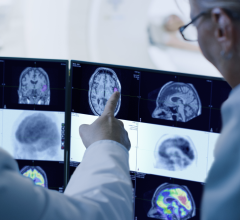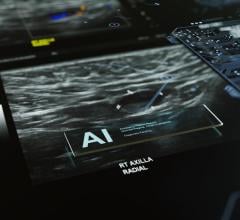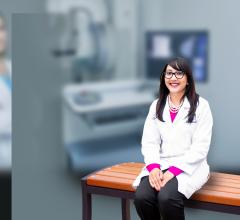
AI technology for MRI data analysis by Prof. Dr. Shadi Albarqouni, Professor of Computational Medical Imaging Research at University Hospital Bonn and Helmholtz AI Junior Research Group Leader at Helmholtz Munich. Image courtesy of © Johann F. Saba, University Hospital Bonn (UKB)
August 26, 2022 — An algorithm developed by researchers from Helmholtz Munich, the Technical University of Munich (TUM) and its University Hospital rechts der Isar, the University Hospital Bonn (UKB) and the University of Bonn is able to learn independently across different medical institutions. The key feature is that it is "self-learning", i.e. it does not require extensive, time-consuming findings or markings by radiologists in the MRI images. This federated algorithm was trained on more than 1,500 MRI scans of healthy study participants from four institutions while maintaining data privacy. The algorithm then was used to analyze more than 500 patient MRI scans to detect diseases such as multiple sclerosis, vascular disease, and various forms of brain tumors that the algorithm had never seen before. This opens up new possibilities for developing efficient AI-based federated algorithms that learn autonomously while protecting privacy. The study has now been published in the journal Nature Machine Intelligence.
Healthcare is currently being revolutionized by artificial intelligence. With precise AI solutions, doctors can be supported in diagnosis. However, such algorithms require a considerable amount of data and the associated radiological specialist findings for training. The creation of such a large, central database, however, places special demands on data protection. Additionally, the creation of the findings and annotations, for example the marking of tumors in an MRI image, is very time-consuming. To overcome these challenges, a multidisciplinary team from Helmholtz Munich, the University Hospital Bonn and the University of Bonn collaborated with clinicians and researchers at Imperial College London and TUM and its University Hospital rechts der Isar. The aim was to develop an AI-based medical diagnostic algorithm for MRI images of the brain, without any data annotated or processed by a radiologist. Furthermore, this algorithm was to be trained "federally": In this way, the algorithm "comes to the data", so that the medical image data requiring special protection could remain in the respective clinic and did not have to be collected centrally.
Learning From Several Institutes Without Data Exchange
In their study, the researchers were able to show that the federated AI algorithm they developed outperformed any AI algorithm trained using only data from a single institution. "In his 'The Wisdom of Crowds,' James Surowiecki argued that large groups of people are smarter, no matter how smart an individual might be. Basically, this is how our federated AI algorithm works," says Prof. Dr. Shadi Albarqouni, Professor of Computational Medical Imaging Research at the Department of Diagnostic and Interventional Radiology at University Hospital Bonn and Helmholtz AI junior research group leader at Helmholtz Munich. To pool knowledge about MRI images of the brain, the research team trained the AI algorithm in different and independent medical institutions without violating data privacy or collecting data centrally. "Once this algorithm learns what MRI images of the healthy brain look like, it will be easier for it to detect disease. To achieve this requires intelligent computational aggregation and coordination between the participating institutes," says Prof. Dr. Albarqouni. PD Dr. Benedikt Wiestler, senior physician at TUM's University Hospital rechts der Isar and also involved in the study, adds: "Training the model on data from different centers contributes significantly to the fact that our algorithm detects diseases much more robustly than other algorithms that are only trained with data from one center."
Towards Affordable Collaborative AI Solutions
By protecting patient data while reducing radiologists' workloads, the researchers believe their federated AI technology will significantly advance digital medicine. "AI and healthcare should be affordable, and that is our goal. With our study, we have taken a step in this direction," says Prof. Dr. Albarqouni. "Our major goal is to develop AI algorithms, collaboratively trained at different, decentralized medical institutes, including those with limited resources."
For more information: https://www.helmholtz-munich.de/en/helmholtz-zentrum-muenchen/index.html


 May 02, 2024
May 02, 2024 








